Steven Pressfield's Blog, page 67
September 21, 2016
Why I Write, Part One
I stumbled onto the website of a novelist I had never heard of. (He’s probably never heard of me either.) What I saw there got me thinking.

What if we worked our whole life and never sold a single painting?
The site was excellent. It displayed all fourteen of the novelist’s books in “cover flow” format. They looked great. A couple had been published by HarperCollins, several others by Random House. The author was the real deal, a thoroughgoing pro with a body of work produced over decades.
Somehow I found myself thinking, What if this excellent writer had never been published?
Would we still think of him as a success?
(In other words, I started pondering the definition of “success” for a writer.)
Suppose, I said to myself … suppose this writer had written all these novels, had had their covers designed impeccably, had their interiors laid out to the highest professional standards.
Suppose he could never find a publisher.
Suppose he self-published all fourteen of his novels.
Suppose his books had found a readership of several hundred, maybe a thousand or two. But never more.
Suppose he had died with that as the final tally.
Would we say he had “failed?”
Would we declare his writing life a waste?
[I’m assuming, for the sake of this exercise, that our writer had been able somehow to support himself and his family throughout his life or that, if he had been supported by someone else (as van Gogh was looked after by his brother Theo), that that was okay with him and with the person supporting him.]
Then I asked myself, What if that was me?
How would I feel about those fourteen books? Would I consider them an exercise in folly? Vanity? Demented self-indulgence?
Would I say to myself, “What’s wrong with you? Why do you continue this exercise in futility? Wake up! Get a job!”
Could I justify all that effort and somehow convince myself that it was worthy, that it had been an honorable use of my time on Earth?
It won’t surprise you, if you’re at all familiar with my thinking in this area, to hear that I would immediately answer yes.
Yes, I would consider that hypothetical writer a success.
I might even declare him a spectacular success.
No, his writing life was not wasted.
No, he had not squandered his time on the planet.
And yes, I would say the same if that writer were me.
My own real-life career is not that far off from this hypothetical. I wrote for seventeen years before I got my first dollar (a check for $3500 for an option on a screenplay that never came near getting made.) I wrote for twenty-eight years before my first novel was published.
What, then, constitutes success for a writer? Is it money? Sales? Recognition? Is it “expressing herself?” Is it “getting her ideas out there?”
Or is it something else?
I’m going to take the next few weeks’ posts and do a little self-examination on this subject, which I think is especially critical in this era of the web and Amazon and print-on-demand and instant and easy self-publishing, these days when literally a million new books appear each year. How do we, how do you and I navigate these waters, not just financially or professionally but psychologically, emotionally, spiritually?
[Thanks to our friend David Y.B. Kaufmann for suggesting this topic.]
September 16, 2016
The Vote Is In!
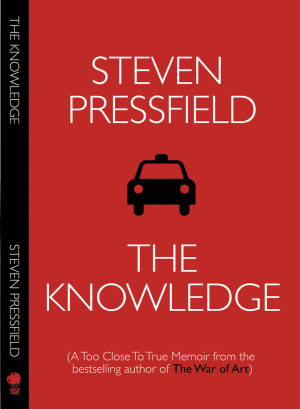
Option 1.
Thank you for all of your input about our potential covers for Steve’s new novel, THE KNOWLEDGE.
And yes, we’re changing the subtitle from A Too Close To True Memoir from the bestselling author of The War of Art to A Too Close To True Novel from the bestselling author of The War of Art. As my grandmother used to say, we were being “too clever by half” with that Memoir classification fudge. If this were a movie, the tagline would be Inspired by a True Story which basically means it’s mostly made up. And readers know that fiction is a “novel,” not memoir…A Million Little Pieces notwithstanding. Big thanks for that help!
We’re thrilled at the enthusiasm of the response and how many people wrote in. Plus our grand tally of votes came in over 1000. It was tremendously helpful and we can’t thank you enough.
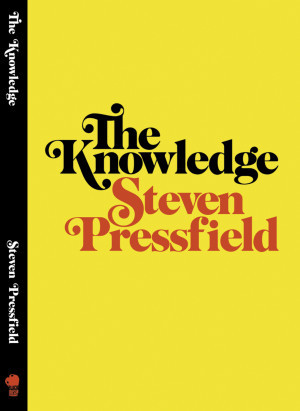
Option 2.
We are going back to the drawing boards and rethinking heavily to incorporate everybody’s GREAT input.
And wait to you see our back cover image!
Stay tuned for the upcoming launch on Wednesday November 23, 2016…the day before Thanksgiving.
Without further ado, here are the results:
Red Cover, Option 1., received 653 votes (64%)
Yellow Cover, Option 2, received 366 votes (36%)
Callie Oettinger will be back next week at What It Takes for our regularly scheduled programming.
September 14, 2016
Inciting Incident = Hook
Why do we even have inciting incidents? Who says there has to be one? Can’t we just plunge in with Word One? Why are we worrying so much about “starting” the story? Doesn’t the story start all by itself?
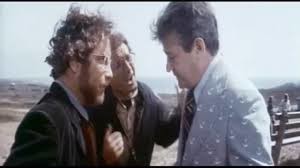
“It’s a Great White and it’s feeding in the waters off Amity!” Richard Dreyfuss, Roy Scheider, and Murray Hamilton in JAWS.
Answer: the inciting incident is indispensable because the inciting incident is the Hook.
When Shawn talks about Hook, Build, Payoff (Act One, Act Two, Act Three), he’s talking about the unshakeable structure of a screenplay, a novel (some of ’em anyway), a play, a joke, a seduction, a plot to overthrow a despot, not to mention your secret 18-year-plan to get your newborn daughter into Harvard.
Beginning, Middle, End.
Beginning = Act One.
Heart of Act One = Inciting incident.
Inciting incident = Hook.
Consider these all-time great grabbers:
BOGEY
Of all the gin joints in all the towns in all the world, she walks into mine.
APOLLO CREED
The Italian Stallion? I’m gonna give this chump a shot at the title.
JASON BOURNE
Who am I?
What you and I as writers must ask ourselves of our own Inciting incident (once we’ve identified it) is this killer question:
Will this moment hook the reader?
True, we’re guessing. There’s no way we can know what our reader or viewer will think or how she/he will react. But, using our deepest empathy, imagining ourselves as profoundly as we can into her/his place, we must ask:
“Is this inciting incident engaging? Does it capture and hold the reader’s attention? Does it make her sit up straight and think, ‘Oooh, this story is really coming alive. I can’t wait to see what happens next!'”
CAPTAIN AHAB
Know this, men. Ye did not ship aboard the Pequod to hunt whales for profit. Ye
shipped to hunt and kill Moby Dick!
EVELYN MULWRAY
You see, Mr. Gittes, I’m Evelyn Mulwray.
ATTICUS FINCH
Scout, I’ll be defending Tom Robinson.
As Bruce Springsteen once said, “You can’t start a fire without a spark.”
The inciting incident—the Hook—is that spark.
[Special thanks to Joel Canfield, whose Comment two weeks ago inspired this post.]
September 9, 2016
Cover Advice

Option 1.
We at Black Irish Books are preparing for our annual end of the year blow-out Thanksgiving/Christmas/Hanukkah/Kwanzaa extravaganza and we need your help.
(Mark your calendars for Wednesday November 24th for the Writing Wednesdays launch. For all of you First Look Access people, you’ll get a first dibs email for the deal/s on Monday November 22nd.)
We’ve got a brand new book from Steve called THE KNOWLEDGE to share. It’s the wild and woolly origin story behind The War of Art. Set in the mean streets of 1970s New York when Steve made every amateur writing mistake imaginable (how do you think he knows so much about them?), we’re calling it a “Too Close To True Memoir.”

Option 2.
[Attention Joel and Ethan Coen…you guys need to option this ASAP!]
Alas, we’re unsure of which cover to go with…
So we thought it would be fun to get your takes.
We’ll keep the ballot boxes open until midnight, next Friday September 16, 2016.
Callie will give you the results in her WIT column next week. Many thanks for voting early and often.
September 7, 2016
The Inciting Incident and “the Call”
An extremely useful way to look at the Inciting Incident is to see it as “the Call,” as in the Hero’s Journey. The two are identical. They’re the same beat.

Setting sail for Tahiti. The inciting incident is the “Call to Adventure”
Here’s Christopher Vogler from his indispensable The Writer’s Journey:
The hero is presented with a problem, challenge, or adventure to undertake. Once presented with a Call of Adventure [boldface his], she can no longer remain indefinitely in the comfort of the Ordinary World.
In Star Wars, the Call to Adventure is Princess Leia’s desperate holographic message to wise old Obi-Wan Kenobi, who asks Luke to join in the quest. In revenge plots, the Call to Adventure is often a wrong, which must be set right. In romantic comedies, [it’s] the first encounter with the special but annoying someone the hero or heroine will be pursuing and sparring with.
See the parallels? In each case the Call is the Inciting Incident. It’s the action or event that sets the story in motion.
But let’s back up a moment to review the concept of the Hero’s Journey.
Two ways to look at it: first, the hero’s journey as a template for storytelling; second, the hero’s journey as a living dynamic in our real lives. Here’s what I wrote about the second way in Nobody Wants to Read Your Sh*t:
The hero’s journey is the Ur-Story of every individual from Adam and Eve to Ziggy Stardust. It’s the primal myth of the human race, the cosmic pattern that each of our lives follows (and a thousand increments thereof), whether we know it or not, whether we like it or not.
If you are the hero of your life (and of course you are), the hero’s journey is the script your life will (more or less) follow, over and over.
According to C.G. Jung, the hero’s journey is a component of the collective unconscious. Joseph Campbell identified it in the myths and legends of virtually every culture on earth. Jung found it arising spontaneously in the dreams and neuroses of his psychiatric patients.
The hero’s journey arose, both men speculated, from the accumulated experience of the human race over millions of years. The hero’s journey is like an operating system (or software in an operating system) that each of us receives at birth, hard-wired into our psyches, to help us navigate our passage through life.
The beats of the hero’s journey go something like this:
Hero starts in Ordinary World.
Hero receives Call to Adventure
Hero rejects Call
Hero encounters Mentor. Mentor gives Hero courage to accept call.
Hero crosses Threshold, enters Extraordinary World.
And so on through trials and ordeals, encounters with weird and wondrous characters, meetings with allies, confrontations with the Villain, finally to Crisis, Climax, and Resolution.
That’s the hero’s journey in our real lives. It’s us falling in love, quitting a job and launching a new venture, joining the CIA, setting sail for Tahiti, writing the Great American Novel.
Which brings us back to the first way of looking at the hero’s journey—as a template for writing a story/novel/screenplay. Star Wars is literally the hero’s journey. George Lucas patterned his script beat by beat upon Joseph Campbell’s template. So is The Wizard of Oz, Titanic, The Terminator, The Martian, When Harry Met Sally, and on and on.
In each case, that beat that you and I would call the Inciting Incident is, in terms of the hero’s journey, the Call to Adventure.
It’s the action or event that launches the hero out of the Ordinary World (also known as Act One) and into the Extraordinary World (Act Two and Act Three), the world of his or her initiation or passage into a deeper and more complete understanding of themselves and of life.
I know. I know what you’re thinking.
Why, you ask, does Steve keep beating this barely-breathing horse? Aren’t such considerations pure arcana? Technical stuff that we, unless we’re going for our Ph.D. in Literature, really don’t need to know?
No, no, and no.
I write just like you do, by the seat of my pants. I wing it. I trust the Muse. I come up with stuff and if it sounds good to me, I scribble it down.
In other words, I work out of my right brain.
But there comes a time (and that time should happen early early early) when you and I, if we’re smart, will and must switch over to our left brains.
We’ll engage our rational intellect.
We’ll take a cold, hard look at the mess we’ve just spewed across X hundred pages and we’ll ask ourselves, Is this stuff working? Is it a story? Will anybody want to read it?
At this point, we start asking ourselves the questions that every professional storyteller asks, among which are the following:
Do I have an Inciting Incident?
What is it?
How do I know it’s a legitimate inciting incident?
Does my hero acquire his or her intention in that moment?
Is the story’s climax embedded in that moment?
Is that moment on-theme?
And, from today …
Does that moment correspond to “the Call” in the hero’s journey?
I’m working on a novel right now and I am doing exactly this. I’m asking myself these exact questions (and many more).
It helps.
It’s critical.
It’s like standing on the deck of a sailboat in the middle of the Pacific, taking a reading of the stars with a sextant.
Trust me, if we omit these steps we will never make it to Tahiti.
September 2, 2016
Chum or Cream? Asinine or Aristotle?

What was so great about what Aristotle had to say — or how he said it?
In Kazuo Ishiguro’s book The Buried Giant, the dragon Querig is blamed for cursing the land with “a mist of forgetfulness.” With each breath, she exhales a mist with the power to shroud those within her range in amnesia.
The mist is an unforgiving thing, wiping out the good and the bad memories. Pain and Happiness exit stage left hand and hand, with Experience and Knowledge joining them.
Axl, an old man at the center of The Buried Giant, can’t understand why a young soldier is familiar to him because Axl has no memory of his own youth. And when Axl meets an old knight, the same occurs. Why is the knight familiar to Axl and Axl in turn familiar to the knight? How could Axl, just an old man, know anything of fighting and battles?
With the emotional and experience memories, the mist stole the memories of how the The Buried Giant’s many characters connected with each other. A strange woman asks Axl’s wife, “How will you and your husband prove your love for each other when you can’t remember the past you’ve shared?”
As the story continues, we find that Merlin was responsible for infusing Querig’s breath with amnesia. In the post-Arthurian period in which the story takes place, the previously warring Britons and Saxons live in peace because they can’t remember the genocide and other atrocities that occurred. Oblivion is Bliss.
The Internet reminds me of Querig’s breath, with Information playing the role of the mist.
Where cream used to rise, chum resides, fueling the top feeders.
All the information bombarding our in-boxes and Facebook walls and Twitter feeds, is “new” — and there’s so much of it to wade through.
Instead, ignore the now and look to the past. Think about how “they” did it before the Internet.
How did Aristotle get people to listen to him? He wasn’t the only philosopher on the block. Why him?
How did Christopher Columbus pull together a trip to the New World, without a Go Fund Me campaign to back him?
How did the Wright Brothers convince people to go for a ride when crashing was a reality?
Why VHS instead of Betamax? Or Coke or Pepsi? Or Apple or Samsung?
Slay the shit at the top and dive deep for how people “did it” before all the tech and info access and you’ll find personal relationships and hard work. You’ll find some assholes, too, but in general, you’ll find that everything you need to know today has existed for thousands of years. Instead of figuring out how to game Facebook and Amazon for success today, figure out what Aristotle did it to achieve longevity hundreds and hundreds of years later.
Find out what has always worked, rather than trying to sort out what works right now.
August 31, 2016
The #1 Mistake That Writers Make
Ah, back to my favorite subject—theme.
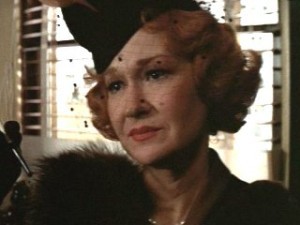
Diane Ladd as the fake Mrs. Mulwray in “Chinatown”
The Number One mistake that writers make is they forget that their book or screenplay must be about something.
That’s crazy, you say. Of course a story has to be about something. But I can’t tell you how many I’ve read that have no theme, no controlling idea, no unifying narrative and emotional architecture.
Which brings us to the next principle in our exploration of Inciting Incidents.
The inciting incident must be on-theme.
Let’s go back to Paper Moon, which we were talking about last week. The theme of the book and movie is “family is everything,” “blood is thicker than water.” The story is about a daughter and father—nine-year-old orphan Addie Loggins (Tatum O’Neal) and the itinerant flim-flam man Moses Pray (Ryan O’Neal) who bears an uncanny resemblance to her—and the daughter’s quest to find and connect with her true dad.
The inciting incident of any story, we know, is the moment when the hero acquires his or her intention. The inciting incident, we’ve said, has the story’s climax embedded in it. The inciting incident puts forward the Narrative Question that will pull us, the readers or viewers, through the story.
From Minute Five of Paper Moon:
ADDIE
You my pa?
MOSES
“Course I ain’t your pa.
ADDIE
You met my mama in a bar room.
MOSES
Just because a man meets a woman in a bar room
don’t mean he’s your pa.
ADDIE
We got the same jaw. We look alike.
MOSES
A lotta people look alike. I know a woman who looks like
a bullfrog. That don’t make her the damn thing’s mother!
See how on-theme this inciting moment is? It is absolutely about the story’s theme of family. It absolutely asks the Narrative Questions that will pull us in the audience through the movie: Will Moses turn out to be Addie’s father? How will we learn this? What will it mean? And it embeds the story’s climax: Addie and Moses coming together as father and daughter.
The theme of Chinatown is “Evil hides under a benign surface.”
Let’s cue up the film and see how the inciting incident embodies this.
The inciting incident of Chinatown is when the real Mrs. Evelyn Mulwray (Faye Dunaway) walks into private investigator Jake Gittes’ office (Jack Nicholson) with her lawyer and informs him that the woman claiming to be Mrs. Mulwray (Diane Ladd) who hired him a week ago to follow her husband was a phony.
EVELYN MULWRAY
Have we ever met?
JAKE GITTES
Well, no.
EVELYN MULWRAY
Never?
JAKE GITTES
Never.
EVELYN MULWRAY
That’s what I thought. You see, I’m Mrs. Evelyn Mulwray.
Clearly Mrs. M. is about to sue poor Jake and make a fool of him in the press.
EVELYN MULWRAY
I see you like publicity, Mr. Gittes. Well, you’re about to get it.
Why is this the inciting incident of Chinatown? Because
One, in it our hero Jake Gittes acquires his intention—to find out who played him for a sucker and to get to the bottom of this scheme and subterfuge.
Two, it establishes the Narrative Questions that will pull us through the movie: Who did set Jake up? Why? What will happen because of this? What does it mean?
Three, the climax is embedded in this moment. Evelyn’s tragic death/murder, Gittes’ getting to the bottom of everything, our understanding of the initial deception.
And four, the inciting incident is 100% on-theme. It’s about deception, it’s about ulterior motives, it’s about how the seemingly-benign surface of things can conceal unfathomed and possibly evil intentions.
Here’s my own confession. In a lot of the stuff I write, I don’t know what the inciting incident is until after I’ve written it. I’m flying by the seat of my pants half the time. I know I’ve got a great start to a story but I don’t know why. It’s only later, in Draft #2 or partway through #1, that I sit down and actually ask myself, “What’s my inciting incident? Do I even have one?”
Almost always I do. I just didn’t realize it.
This is how knowledge of storytelling principles is invaluable for the writer. I can ask myself, “Does my inciting incident give the hero his intention?” “Does it ask the Narrative Questions that will pull the reader through the story?” “Is the climax embedded in it?” And “Is it on-theme?”
Next week: the Inciting Incident corresponds to “the Call” in Joseph Campbell’s concept of the Hero’s Journey.
August 26, 2016
What Fresh Hell?

The Inimitable Dorothy Parker
Forgive me if you’ve heard this one before.
I remembered an old joke when I was doing some of the course work for my friend Tim Grahl’s online course, The Productive Writer. I’m taking it to recharge the old writing batteries and learn how to lure the Muse out of hiding more often.
Wisely I think, Tim doesn’t start his course with quick fix tactics to get your ass in your writing chair. Instead he starts with getting you to explore why you want to be a writer in the first place.
One of the questions he has you answer in the second day of work is this:
How will your life look different when you reach your dream of being a full-time writer?
After answering it for myself, I remembered this joke:
A much as he hates to go above ground, Satan decides it’s about that time again to do a little marketing. To keep his numbers up.
His first and only stop…Los Angeles’ biggest talent agencies.
He goes to WME, CAA, UTA and meets with all of the heads, and all of those “hot” agents angling to one day be heads too.
He explains that he’s decided to change Hell. He’s going to make it extraordinarily comfortable. Not such a downer. He understands that he needs to counter-program the terrible reputation it has.
The thing is, he’s just tired of losing souls to Heaven… And as a reasonable person he’s not averse to change.
But he recognizes that he needs help. That’s the first step, right? Recognizing that you need help? So he’s come to meet with these agents to see if they would be interested in checking out his account. Money’s no object of course. Whatever it takes to get the true gen about the old homestead out there, he’ll pay.
Before they decide about the job though, would they be interested in taking a tour? Checking out the new digs?
No commitments necessary. Satan just wants their professional opinions about what he’s done with the place and of how he might improve it.
And just before he leaves each meeting, Satan asks that each of the agents not share this information with anyone else. It’s confidential you see.
All the agents vehemently agree that they will do no such thing. They’ll keep the info locked up in their unbreachable neural vaults. (This piece from The Hollywood Reporter convinced me to add that little bit to the joke)
All of the agents agree to take a “no risk tour” of FRESH HELL.
Satan schedules their appointments back to back so that WME sees that CAA is there and UTA sees that WME is there etc. etc.
They all discover that what Satan has done with Hell is incredible. There are spas and remarkable vistas and incredibly helpful attendants. It’s just stunning. Like The Four Seasons without the big bill at the end.
All of the agents agree that this FRESH HELL will change the face of earth. No longer will people fear the wrath of Hell. The relief that there will be no penalty to pursuing one’s own personal desires above all else will be HUGE! HUGE!
Satan thanks them but says that as they all can imagine, he has limited space for FRESH HELL and that he’ll need early commitments to fill the slots he has available. And as he’s sure they’ll understand, he just can’t divulge the total numbers available as that will dis-incentivize people to ACT NOW!
The agents nod in understanding.
He then goes on to tell them that he has set aside some very special VIP sections of FRESH HELL for those who’ve helped him with the re-brand and marketing. He would be honored if they chose to spend eternity behind his very special velvet rope.
No pressure, of course, but Satan is due above to meet with Wall Street consiglieres in an hour, so it might be best for them to sign up now while the spots are still available…
All of the agents excitedly commit to the FRESH HELL and they’re thrilled to jump into the re-brand too.
And in an incredible show of just how much they believe in Satan’s new plan, all three of the agencies work together to get things rolling.
All of the biggest movie stars and celebrities publicly commit to FRESH HELL. They post on Facebook and tweet incessantly about the perks.
Satan’s work is complete in short order.
He’s got enough subscriptions to stay underground for generations. And all of those with coveted reserved spaces rest easy and continue to satisfy their own desires without care for anyone else. Billionaires relax. It’s a beautiful thing if you’re one of the beautiful ones.
Inevitably, though, the day comes when one of the “key agents” passes away. His passing isn’t such a big deal though. It’s almost pleasant as he’s not concerned with eternity. He’s tight with the man downstairs.
When he arrives in the FRESH HELL! though…it’s absolutely horrifying.
It’s crazy hot. Lakes of fire…demons harassing him constantly…just well…nothing fresh about it at all!
In fact, it seems very much like the old Hell. Not a masseuse in sight!
The dead agent is no patsy you understand. And he insists on seeing the man in charge.
After a time his guardian demon, for a giggle, takes the agent to meet with Satan.
After some pleasantries, the agent gets to the point…
“What Gives? What you’ve promised ain’t nothing like what you’ve delivered!”
To which Satan replies,
“Oh…you see when I met with you on Earth you were a prospect… Now you’re a client.”
August 24, 2016
Study Stuff That Works
I was watching True Grit the other night, the 2010 version with Jeff Bridges as Rooster Cogburn. A couple of weeks earlier I had revisited Paper Moon, one of my all-time faves, with Ryan O’Neal and Tatum O’Neal.
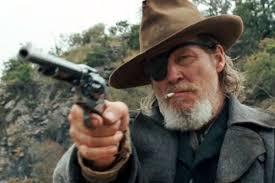
Jeff Bridges as Rooster Coburn in “True Grit.”
True Grit and Paper Moon are basically the same movie.
The key is in the Inciting Incident.
Let’s continue, then, our exploration of the Inciting Incident and how it works to infuse a story with power and narrative drive …
The story’s climax is embedded in the inciting incident.
Last week we talked about the two narrative “poles” that are set up the instant the inciting incident appears.
The first is the incident itself, in which the hero acquires his or her intention–the life-and-death impulsion that will propel him/her through the story.
The second is the as-yet-to-be-revealed resolution of this intention.
Will the hero get what she’s after?
How?
What will we learn as we watch her struggle?
Let’s consider True Grit and Paper Moon and see how the climax of each story is embedded in the inciting incident.
The inciting incident of Paper Moon is when nine-year-old Addie Loggins (Tatum O’Neal), who has just lost her mother, is sitting across a Kansas cafe table from Moses Pray (Ryan O’Neal), a traveling flim-flam man who knew her mom and who bears an uncanny resemblance to Addie herself.
ADDIE
You my pa?
MOSES
‘Course I ain’t your pa.
ADDIE
You met my mama in a bar room.
MOSES
Just because a man meets a woman in a bar room,
that don’t mean he’s your pa.
See the two poles?
Number One: Addie, we now know, wants Moses to be her father (she has acquired her intention) and she wants to be with him.
Number Two (which we don’t yet know); Will Moses turn out to be Addie’s pa? Will they stay together? How will this happen if indeed it does?
These questions will pull us powerfully through the story.
I won’t ruin the climax for you if you haven’t seen it or read it yet, but suffice it to say, all questions are answered in a wonderfully warm and satisfying way.
The climax of Paper Moon was embedded in the inciting incident.
True Grit is emotionally almost identical.
In True Grit, fourteen-year-old Mattie Ross (Hallee Steinfeld) in post-Civil War Arkansas has just lost her dad—murdered by the outlaw Tom Chaney (Josh Brolin) who has fled into Indian territory. Seeking justice, Mattie hires U.S. marshal Rooster Cogburn (Jeff Bridges) to track the malefactor down and bring him back to be hung.
The inciting incident is when Rooster agrees to take the job—and allows Mattie to come along.
Why is this the inciting incident (and not, say, the moment when Mattie acquires the intention to hunt down Tom Chaney?) Because True Grit, like Paper Moon, is about a young girl’s quest for a father or a father figure.
The intention that Mattie acquires that propels the story forward (in addition to, and superseding, her intention to bring Tom Chaney to justice) is the intention to find a new dad or surrogate in the form of Rooster, the wild and wooly marshal who possesses “true grit.”
Again, I won’t spoil the ending for you except to say that, as in Paper Moon, child and man find a bonding moment that lasts lifelong.
Again, the climax is embedded in the inciting incident.
Again the questions put forward by the inciting incident—will Mattie and Rooster bond with each other as “dad” and daughter? How? What will it mean?—are what pull us in the audience through the movie.
One sidebar:
Both these books/movies are love stories and as such they follow the convention that the “couple” must break apart before they can be ultimately united in the end.
In Paper Moon the darkest moment comes right before the finish.
MOSES
(to Addie)
I told you I don’t want you riding with me no more.
True Grit gives us Jeff Bridges in this moment at his growly, boozed-up best.
ROOSTER
I’m a foolish old man who’s been drawn into a wild
goose chase by a harpy in trousers and a nincompoop.
You, sister, may go where you will. Our engagement is
terminated. I bow out.
When we begin to think of ourselves as professional writers, we set about studying stuff that works. How does Charles Portis (who wrote the book, True Grit) do it? How did the Coen brothers make the movie work? How did Paper Moon, by Joe David Brown, work so well? How did Alvin Sargent and Peter Bogdanovich structure the movie script to be so effective?
I love doing this. It’s great fun dissecting material that really hums.
The next step of course is applying these principles to our own stuff.
Do we have an inciting incident?
What is it?
In that moment, does the hero acquire his or her intention?
What is that intention, i.e. the first “narrative pole?”
What is the second pole, i.e. the story’s climax?
Is the climax embedded in the inciting incident?
These are not academic questions. They are the soul and sinew of storytelling and the architecture of the books and movies you and I are trying to write.
We need to teach ourselves this stuff and learn how to apply it.
Next week: the Inciting Incident must always be on-theme.
August 19, 2016
Louis C.K.: Give It A Minute
(Revisiting an old — and favorite — post as summer closes out and I find myself wishing I’d caught a stop on Louis C.K.’s recent tour. . . ~Callie)
In a recent New York Time interview with Louis C.K., Dave Itzkoff commented, “You have the platform. You have the level of recognition.”
Louis C.K. replied with a question: “So why do I have the platform and the recognition?”
Itzkoff answered, “At this point you’ve put in the time.”
Pause after you read Louis C.K.’s follow-up:
There you go. There’s no way around that. There’s people that say: “It’s not fair. You have all that stuff.” I wasn’t born with it. It was a horrible process to get to this. It took me my whole life. If you’re new at this — and by “new at it,” I mean 15 years in, or even 20 — you’re just starting to get traction. Young musicians believe they should be able to throw a band together and be famous, and anything that’s in their way is unfair and evil. What are you, in your 20s, you picked up a guitar? Give it a minute.
Put in the Time
Almost every author I’ve met has mentioned a desire to be interviewed by Oprah, Jon Stewart, Stephen Colbert and/or Charlie Rose.
I get it. Being interviewed by any of those individuals will garner the authors attention and book sales.
But the reality is that most authors don’t land those interviews right out of the gate. And, while those interviews can spike initial sales, they don’t keep things going on their own. They’re a short-term fix.
In an interview with The Paris Review William Faulkner spoke about what writers need to write. The same applies to doing outreach for your projects, sharing/marketing them:
The writer doesn’t need economic freedom. All he needs is a pencil and some paper. I’ve never known anything good in writing to come from having accepted any free gift of money. The good writer never applies to a foundation. He’s too busy writing something. If he isn’t first rate he fools himself by saying he hasn’t got time or economic freedom. Good art can come out of thieves, bootleggers, or horse swipes. People really are afraid to find out just how much hardship and poverty they can stand.
Outreach is Hard Work
Doing outreach/marketing our art is hard work. It’s painful. Reviewers can be nasty and comments left by today’s online community are about as pleasant as a rabid Pit Bull.
It’s hard to look for the good and keep pushing through the crap, piling up faster than ants at a Fourth of July picnic.
But you do it. You don’t say you’re “too busy” that you haven’t “got time or economic freedom.” You figure it out and keep pushing, even if it takes you 50 years.
I Don’t Do Outreach. I Create for Myself.
Last month, the New York Times ran a few articles about artist Arthur Pinajian, “a reclusive artist whom the art world had not known much about. Now, 14 years after his death, he has fans who mention him in the same sentence as Gauguin and Cézanne.”
When Pinajian died, his sister, in whose home “Pinajian had an 8-foot-by-8-foot studio” and who “supported him for much of his life” told a cousin, Peter Najarian, “Oh, just put it all in the garbage. . . . He said himself to just leave it all for the garbagemen.”
Najarian kept the paintings instead.
Read the article for the full story. Bottom line: Though Pinajian had networked earlier in his life, he became a “hermit.” After a point, it seems neither he nor his art left his studio.
If this was his goal, fine.
But the selfish side of me asks, But what about us? We would have loved to have known about your work earlier.
While you didn’t create for money, money it seems is being made off you work—by those who didn’t create it. Do you care?
Perhaps he’d answer that he didn’t care. That money wasn’t the point—and that he doesn’t care if others profit.
Money aside, what about the art? Isn’t the creation itself something that is meant to be shared?
In the same Paris Review interview, Faulkner said:
If I had not existed, someone else would have written me, Hemingway, Dostoyevsky, all of us. Proof of that is that there are about three candidates for the authorship of Shakespeare’s plays. But what is important is Hamlet and A Midsummer Night’s Dream, not who wrote them, but that somebody did. The artist is of no importance. Only what he creates is important, since there is nothing new to be said. Shakespeare, Balzac, Homer have all written about the same things, and if they had lived one thousand or two thousand years longer, the publishers wouldn’t have needed anyone since.
The art came for a reason.
And perhaps something inspired Pinajian’s cousin to keep it for the same reason: It wasn’t meant for the trash, but for a wider audience.
The same might be said of John Kennedy Toole’s mother, who held her son’s manuscript tight after he committed suicide, and then pushed until she found a publisher for his book, A Confederacy of Dunces.
At the end of a second New York Times article about Pinajian appears,:
“He thought he was going to be the next Picasso,” Mr. Aramian said. “They believed he would become famous and this would all pay off for them one day, but it just never happened. So he became frustrated and withdrew from everything and just painted.”
I wonder about what he was or wasn’t doing to share his work earlier. And I wonder why the art community of that time didn’t recognize his talent. And whether the best came after he closed himself off.
One thing I know: His work was meant to be shared. I wish it had happened while he was alive. And, I wish I knew why it is easier for some and harder for others—why the one-hit wonders break out and the long-term artists are recognized after they’ve died—if at all.
For writers, the Internet has opened opportunities that don’t translate into other mediums. Viewing a wall-sized Monet isn’t the same on a laptop as it is in person. I’m not living in that world, but I imagine it a harder place to build a following, to break into. But, the benefits of an established platform remain the same.
Back to the Platform and Louis C.K.
What about those artists who do make it big, yet stay out of the spotlight? They don’t do interviews. They don’t muck around with press tours. They write. That’s it.
How did they do it?
Good writing and at some point either they—or someone else—built a platform. And now? That platform is on auto-pilot; it hit a point of self-sustainability.
And that brings us back to Louis C.K.
You have to put in the time. In addition to creating/building, you have to build the platform.
Some people win the lottery, but most of us hammer away for decades. That’s not a bad thing. It takes patience. It takes commitment.
As Faulkner said, “People really are afraid to find out just how much hardship and poverty they can stand.”
Follow Louis C.K.’s advice and “Give it a minute.”
At least a minute…



